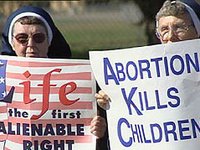SD Legislature To Consider Abortion Ban
 In the next six weeks, South Dakota lawmakers will decide whether to make abortion a crime.
In the next six weeks, South Dakota lawmakers will decide whether to make abortion a crime.A bill that would ban abortion in the state will be introduced within the next two days.
The bill will be called the Woman's Health and Life Protection Act. It will ban abortion, but won't prosecute a doctor who performs one to save a woman's life.
And the lawmaker who's introducing the bill says he thinks now is the right time to try and over-turn Roe vs Wade.
Rep. Roger Hunt says, "Abortion should be banned."
Those four words will likely lead to many others in the South Dakota House and Senate as lawmakers will decide whether to criminalize abortion in the state. The bill's supporters are using findings from a controversial abortion task force report recently given to the legislature.
Hunt says, "DNA testing now can establish the unborn child has a separate and distinct personality from the mother. We know a lot more about post-abortion harm to the mother."
The legislature debated a similar bill two years ago, but Governor Mike Rounds vetoed it because of concerns over some technicalities.
Hunt says, "We have made those corrections to the bill."
Sunday, Hunt and other anti-abortion advocates held an event promoting their legislation. They say now is the time to pass it, because other states are considering similar bills and because with new Chief Justice John Roberts, and possibly Samuel Alito, the US Supreme Court is changing.
Hunt says, "Two very solid, we feel, pro-life candidates. Again you never know but based on their testimony to the senate we feel they're good candidates."
Hunt says he thinks enough other lawmakers support the bill for it to pass, but he still thinks the decision will be a close one.
He says, "I learned a long time ago the only time you really count the votes is when you're taking the votes."
Hunt will also introduce two other bills this week. One is meant to ensure doctors explain the risks of an abortion to a woman is writing. The other deals with sex education and says school districts need to include principles in their curriculums dealing with abstinence and personal responsibilities.
For the entire text of South Dakota law which will force the Supreme Court to reconsider Roe v. Wade, CLICK HERE

